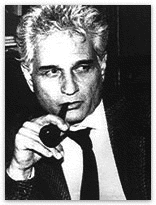Princeton University Acquires Jacques Derrida’s Personal Library

The Princeton University Library has acquired the personal library of philosopher Jacques Derrida, an Algerian-born French Jewish philosopher who influenced virtually every area of humanistic scholarship and artistic activity in the latter part of the 20th century.
Derrida’s writings helped transform how people understood a range of disciplines and areas in the humanities, including philosophy, theology, literature, art, music, architecture, anthropology, cultural studies, gender studies, law, psychoanalysis, human rights, linguistics and political theory.
He is most widely known for developing a form of semiotic analysis known as deconstruction, a strategy for reading texts.

Roland Barthes (Paris: Editions du Seuil, 1963). Photo: J. L. Logan.
Derrida’s library, consisting of about 13,800 published books and other materials, represents a lifetime of reading. But for Derrida, the act of reading was not a passive process: he engaged with what he read, covering pages with notes and cross-references, inserting other handwritten materials, quoting and adapting what he read into what he wrote. As Derrida himself said in an interview later in his life, his books bear “traces of the violence of pencil strokes, exclamation points, arrows, and underlining.”
Anthony Grafton, the Henry Putnam University Professor of History at Princeton University, said that the great libraries of original and influential scholars like Derrida show those writers at their desks, responding to other minds.
“Reading marginal notes, we stand at the scholar’s shoulder and listen in on the discussion between scholar and author, as it takes place,” he said. “It is wonderful—in an ironic way that would have appealed to no one more than Jacques Derrida—that scholars and students will be able to reconstruct his part in this great humanistic tradition in Firestone Library.”
Hal Foster, co-director of the Program in Media and Modernity at Princeton University, said Derrida developed his own thought through a meticulous engagement with other thinkers, past and present, thinkers who at once constitute the Western traditions of philosophy and literature and defy them.
“What a boon it is for us at Princeton to have his notes on these thinkers and writers, to see the master of textuality perform, as it were, on other master texts,” he said.
After more than a year of discussions and complex arrangements coordinated by the Princeton University Library’s collection development department, and an examination of the collection in Paris by an expert team from Princeton, the Princeton University Library took physical delivery of Derrida’s library on Thursday, March 19.
The unpacking, sorting, describing, organizing, preserving, and housing of the books and other materials in the collection will proceed as quickly as possible. As they are processed, these materials will be made available to scholars through the Princeton University Department of Rare Books and Special Collections in Firestone Library.
“It is so exciting to be able to bring the entire reading world of Jacques Derrida to Princeton, to make these works which were so central to the development of his thinking accessible for new explorations in the archaeology of reading, digital humanities, and other research and pedagogical endeavors of scholars and students,” says David Magier, associate librarian for collection development at Princeton University.
“The acquisition of Jacques Derrida’s personal library… makes available to scholars worldwide for the first time the foundational materials of deconstruction—Derrida’s reading materials—and the ‘traces’ of his singular encounter with them,” said Katie Chenoweth, assistant professor of French and Italian at Princeton University.
“How satisfying that (Derrida’s) library should come to Princeton,” said Michael Wood, emeritus professor of English and comparative literature at Princeton University. “The presence of these books in Princeton not only enriches the archive, it suggests something of the intense, ongoing life an archive may have.”

you must have forgotten the April Fool’s tag at the end because it has been nearly three decades since that kind of praise for Derrida could be taken seriously.
Funny, I thought it was this sort of facile dismissal of Derrida that went out of fashion long ago.